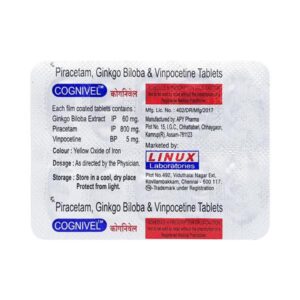GINKGO BILOBA + PIRACETAM + VINPOCETINE
Ginkgo Biloba: Ginkgo Biloba is an herbal supplement derived from the leaves of the Ginkgo Biloba tree. It has been used for centuries in traditional medicine to improve memory and cognitive function. In modern times, it is mainly used as a natural remedy for overall brain health and to help alleviate symptoms of cognitive decline.
The exact mechanism of action of Ginkgo Biloba is not fully understood. However, it is believed to have antioxidant properties that protect against cell damage caused by free radicals. It also improves blood flow to the brain, which can enhance memory and cognitive function.
The recommended dose of Ginkgo Biloba varies depending on the specific product and the condition being treated. However, a common dose range is 120-240 milligrams per day. It is usually taken in divided doses with meals.
While Ginkgo Biloba is generally considered safe for short-term use, it can have some mild side effects. These can include headache, dizziness, upset stomach, diarrhea, and allergic skin reactions. It can also increase the risk of bleeding, so it should be used with caution in individuals with bleeding disorders or those taking blood-thinning medications.
It is important to note that Ginkgo Biloba can interact with certain medications, including blood thinners, antidepressants, and anticonvulsants. Therefore, it is advisable to consult with a healthcare professional before starting Ginkgo Biloba, especially if you have any pre-existing medical conditions or are taking any other medications.
Piracetam: Piracetam is a nootropic drug that is used to improve cognitive function and memory. It is part of the racetam family of drugs and is commonly prescribed for the treatment of cognitive disorders such as dementia, Alzheimer’s disease, and age-related memory decline.
The exact mechanism of action of piracetam is still not fully understood. However, it is believed to work by enhancing neuronal function and improving communication between brain cells. It may also increase blood flow and oxygen utilization in the brain, leading to improved cognitive function.
The recommended dose of piracetam varies depending on the condition being treated. For cognitive disorders and memory improvement, the usual dosage ranges from 1.2 to 4.8 grams per day, divided into two or three doses. It is typically taken orally with water or food. The duration of treatment may vary, and it is best to follow the instructions provided by a healthcare professional.
Piracetam is generally considered safe and well-tolerated. However, some common side effects may include headaches, nervousness, insomnia, gastrointestinal disturbances, and dizziness. These side effects are usually mild and transient, and they tend to diminish with continued use. If any severe side effects occur or persist, it is important to consult a healthcare professional.
Piracetam may interact with certain medications and supplements, so it is essential to inform the healthcare provider about any other drugs or supplements being taken. Additionally, piracetam may not be suitable for individuals with kidney disease, as it is primarily excreted through the kidneys.
Overall, Piracetam is a widely used cognitive enhancer that can improve memory and cognitive function. However, it is important to consult a healthcare professional before starting this medication to determine the appropriate dosage and assess any potential risks or interactions.
Vinpocetine: Vinpocetine is a synthetic derivative of the natural substance vincamine found in the Periwinkle plant. It is commonly used as a dietary supplement to improve cognitive function, memory, and concentration.
The mechanism of action of Vinpocetine involves increasing blood flow to the brain and enhancing the utilization of glucose and oxygen. It also exhibits antioxidant and anti-inflammatory effects, which may contribute to its neuroprotective properties.
The recommended dose of Vinpocetine is typically between 5-20 mg per day. It is important to follow the instructions on the product label or consult a healthcare professional for the appropriate dosage, as it may vary based on individual needs.
While Vinpocetine is generally well-tolerated, it can cause a few side effects. Some common side effects include headache, dizziness, nausea, gastrointestinal disturbances, and flushing. These side effects are usually mild and transient.
It is important to note that Vinpocetine may interact with certain medications, such as blood thinners, antiplatelet drugs, anticoagulants, and drugs metabolized by the liver. Therefore, it is crucial to speak with a healthcare professional before starting Vinpocetine, especially if you have any existing medical conditions or are on other medications.
Please note that Vinpocetine is classified as a dietary supplement and is not evaluated or approved by the FDA for the treatment or prevention of any disease. It is always recommended to consult with a healthcare professional before starting any new dietary supplement or medication.

